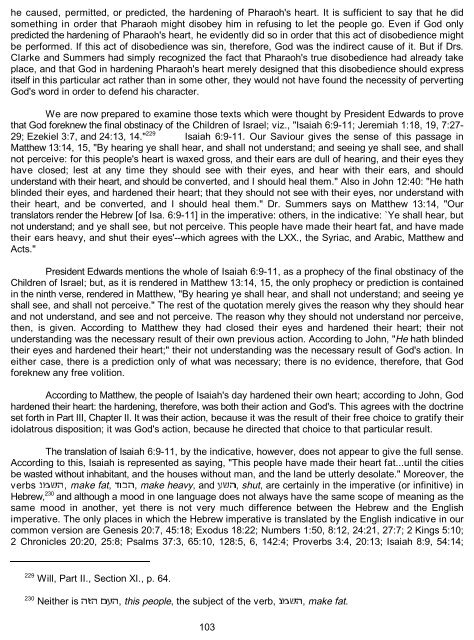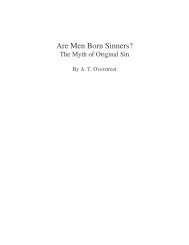Foreknowledge by Joel Hayes - Library of Theology
Foreknowledge by Joel Hayes - Library of Theology
Foreknowledge by Joel Hayes - Library of Theology
Create successful ePaper yourself
Turn your PDF publications into a flip-book with our unique Google optimized e-Paper software.
he caused, permitted, or predicted, the hardening <strong>of</strong> Pharaoh's heart. It is sufficient to say that he did<br />
something in order that Pharaoh might disobey him in refusing to let the people go. Even if God only<br />
predicted the hardening <strong>of</strong> Pharaoh's heart, he evidently did so in order that this act <strong>of</strong> disobedience might<br />
be performed. If this act <strong>of</strong> disobedience was sin, therefore, God was the indirect cause <strong>of</strong> it. But if Drs.<br />
Clarke and Summers had simply recognized the fact that Pharaoh's true disobedience had already take<br />
place, and that God in hardening Pharaoh's heart merely designed that this disobedience should express<br />
itself in this particular act rather than in some other, they would not have found the necessity <strong>of</strong> perverting<br />
God's word in order to defend his character.<br />
We are now prepared to examine those texts which were thought <strong>by</strong> President Edwards to prove<br />
that God foreknew the final obstinacy <strong>of</strong> the Children <strong>of</strong> Israel; viz., "Isaiah 6:9-11; Jeremiah 1:18, 19, 7:27-<br />
229<br />
29; Ezekiel 3:7, and 24:13, 14." Isaiah 6:9-11. Our Saviour gives the sense <strong>of</strong> this passage in<br />
Matthew 13:14, 15, "By hearing ye shall hear, and shall not understand; and seeing ye shall see, and shall<br />
not perceive: for this people's heart is waxed gross, and their ears are dull <strong>of</strong> hearing, and their eyes they<br />
have closed; lest at any time they should see with their eyes, and hear with their ears, and should<br />
understand with their heart, and should be converted, and I should heal them." Also in John 12:40: "He hath<br />
blinded their eyes, and hardened their heart; that they should not see with their eyes, nor understand with<br />
their heart, and be converted, and I should heal them." Dr. Summers says on Matthew 13:14, "Our<br />
translators render the Hebrew [<strong>of</strong> Isa. 6:9-11] in the imperative: others, in the indicative: `Ye shall hear, but<br />
not understand; and ye shall see, but not perceive. This people have made their heart fat, and have made<br />
their ears heavy, and shut their eyes'--which agrees with the LXX., the Syriac, and Arabic, Matthew and<br />
Acts."<br />
President Edwards mentions the whole <strong>of</strong> Isaiah 6:9-11, as a prophecy <strong>of</strong> the final obstinacy <strong>of</strong> the<br />
Children <strong>of</strong> Israel; but, as it is rendered in Matthew 13:14, 15, the only prophecy or prediction is contained<br />
in the ninth verse, rendered in Matthew, "By hearing ye shall hear, and shall not understand; and seeing ye<br />
shall see, and shall not perceive." The rest <strong>of</strong> the quotation merely gives the reason why they should hear<br />
and not understand, and see and not perceive. The reason why they should not understand nor perceive,<br />
then, is given. According to Matthew they had closed their eyes and hardened their heart; their not<br />
understanding was the necessary result <strong>of</strong> their own previous action. According to John, "He hath blinded<br />
their eyes and hardened their heart;" their not understanding was the necessary result <strong>of</strong> God's action. In<br />
either case, there is a prediction only <strong>of</strong> what was necessary; there is no evidence, therefore, that God<br />
foreknew any free volition.<br />
According to Matthew, the people <strong>of</strong> Isaiah's day hardened their own heart; according to John, God<br />
hardened their heart: the hardening, therefore, was both their action and God's. This agrees with the doctrine<br />
set forth in Part III, Chapter II. It was their action, because it was the result <strong>of</strong> their free choice to gratify their<br />
idolatrous disposition; it was God's action, because he directed that choice to that particular result.<br />
The translation <strong>of</strong> Isaiah 6:9-11, <strong>by</strong> the indicative, however, does not appear to give the full sense.<br />
According to this, Isaiah is represented as saying, "This people have made their heart fat...until the cities<br />
be wasted without inhabitant, and the houses without man, and the land be utterly desolate." Moreover, the<br />
verbs , make fat, , make heavy, and , shut, are certainly in the imperative (or infinitive) in<br />
230<br />
Hebrew, and although a mood in one language does not always have the same scope <strong>of</strong> meaning as the<br />
same mood in another, yet there is not very much difference between the Hebrew and the English<br />
imperative. The only places in which the Hebrew imperative is translated <strong>by</strong> the English indicative in our<br />
common version are Genesis 20:7, 45:18; Exodus 18:22; Numbers 1:50, 8:12, 24:21, 27:7; 2 Kings 5:10;<br />
2 Chronicles 20:20, 25:8; Psalms 37:3, 65:10, 128:5, 6, 142:4; Proverbs 3:4, 20:13; Isaiah 8:9, 54:14;<br />
229<br />
Will, Part II., Section XI., p. 64.<br />
230<br />
Neither is , this people, the subject <strong>of</strong> the verb, , make fat.<br />
103






